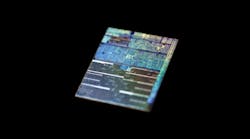Startup Predicts Failures in Electronics by Eyeing the Chips Inside
As increasingly complex circuitry is compressed into today's chips, ProteanTecs promises to predict failures inside them using artificial intelligence. The company claims that its products can point out potential defects and other inefficiencies before chips are produced, trimming development time. They can also be used to monitor their performance and overall health after the chips are deployed in the field, boosting system reliability, the startup says.
ProteanTecs has started turning some heads. On Monday, the startup said that it had raised $35 million in funding from Intel Capital, Viola Ventures, Walden River Ventures, and Avigdor Willenz, the founder of Annapurna Labs and Galileo, among other investors. The company was founded by Shai Cohen, Roni Ashuri and Evelyn Landman—Mellanox's former chief operating officer, senior VP of engineering and VP of product engineering, respectively.
ProteanTecs' main product is a tiny semiconductor core, called an agent, which can be dropped directly into chip designs. The devices serve as sensors delivering data that can be used to root out potential problems that can imperil the chip's performance. Customers can also tap the agents to assess the overall system's reliability while pointing out the source of problems. The system's remaining useful life can also be monitored from the company's cloud.
The company, which has raised $50 million total since it was founded in 2017, intends to use the investment to speed up product development and build out its customer base. "Reliability and predictive maintenance will no longer be a boundless effort and cost, but rather an accessible, accurate and common asset, spanning across the industry," said Lip Bu-Tan, chief executive of Cadence Design Systems and managing partner of Walden River Ventures.
ProteanTecs' tools are designed to be used throughout the chip's lifecycle. The company plans to sell EDA tools that can be used to project hundreds of different permutations of the chip ahead of production. These tools give customers insights into design decisions that affect power, performance, area and cost. Customers can also take advantage of the agents during production to spot potential defects, not only curbing costs but also reducing time-to-market.
"We offer a one-stop cloud-based platform," Shai Cohen, who also serves as the company's chief executive, said in a statement. He added that ProteanTecs uses artificial intelligence and analytics tools to assess the data—what it calls universal chip telemetry, or UCT—dispensed by its agents. "This significantly imporves chip and system production quality, while tracking operational reliability and alerting on faults before they become failures."

